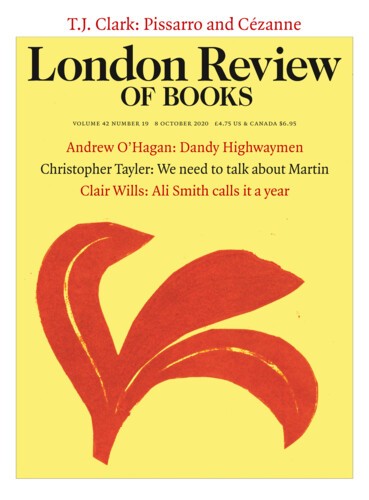Lorna Scott Fox
Lorna Scott Fox translates from Spanish.
Since last September, Monday to Friday, City of London Magistrates’ Court has been filled by Extinction Rebellion defendants from around the country. XR court supporters are on hand with vegan snacks, hugs and advice, within limits. We’re not legally trained but we’re learning, recording arguments and outcomes, watching for patterns. It’s gumming up the system: the trials, single or in batches, may occupy all three courtrooms all day. At the end, the district judge typically commends the defendants for their high-minded unselfishness (a pleasant change, one said, from the usual lot), expresses personal sympathy with their concerns – and finds them guilty as charged.
‘Here, the dead are more alive than ever,’ the ad on the radio said. ‘That’s why I love Mexico.’ I was on my way to Tlayacapan, one of Mexico’s pueblos mágicos, a category invented to promote tourism. Tourism is down in this magic village. Located near the epicentre of the earthquake of 19 September, in Morelos state, south-west of the capital, it experienced the worst impact in living memory. There are husks of adobe homes on every street, most of the churches are damaged, and the town hall clock tower fell; the arches where the last scene of Butch Cassidy and the Sundance Kid was filmed are still standing, pocked and scuffed as if after a gun battle. I saw a sign flapping taped to a gate: ‘Careful with the wall.’ A woman was organising a tequio, the old indigenous form of community labour, to make adobe bricks. Scrawled in purple all the way across a yellow house, its outbuildings now tidied into piles of rubble, was: ‘Thanks to everyone for your help.’ The state is nowhere to be seen, apparently.
There’s a video online purportedly of the moment last night’s earthquake struck northern Chile. We’re in a small flat, maybe in Iquique. Women scream, a man keeps saying ‘It’ll pass, it’ll pass,’ as the mobile phone, presumably held by a heartless teenager, sways through rooms where everything is bouncing and falling off the walls. The noise is deafening. That’s what scared me most during my first quake, the huge one (magnitude 9.5) in Chile in 1960. I was too small to understand till much later how deadly it was. Apart from the racket – imagine every single object in the house coming to life, banging, sliding, rattling, creaking, and often crashing down – it was rather fun: tiles flying off the roof, the swimming pool slopping from side to side, the cook on her knees, imploring the Virgin at the top of her voice.
On 25 September, thousands of Spanish citizens from students to pensioners set out to surround the parliament building in Madrid, demanding an end to the current political system and the establishment of a new Constituent Assembly. The deputy prime minister dared to compare it to 23-F, the failed coup in 1981 when pistol-popping Civil Guards took the parliamentary chamber hostage. Days before last week’s action, the national police fenced off the whole area. I was in a bar nearby when three cops wandered in for a drink the night before the demonstration. What did they think about it? ‘As police officers, we’ll do our job,’ said one. ‘But we are also individuals in society. I’d be out there with them.’ ‘Yup, 90 per cent of us would be there,’ said another. Maybe the other 10 per cent included the riot police, who in the event did their job with convincing enthusiasm.
Pieces about Lorna Scott Fox in the LRB
Can they? Podemos
Dan Hancox, 17 December 2015
‘I have defeat tattooed in my DNA,’ Pablo Iglesias said in a debate on television last year, a month after announcing the formation of a new political entity called Podemos....
Strangers
Alasdair MacIntyre, 16 April 1981
It is no secret that philosophy as it is taught and studied at UCLA or Princeton or Oxford is very different from philosophy as it is understood at Paris or Dijon or Nice. An intellectual milieu...
Read anywhere with the London Review of Books app, available now from the App Store for Apple devices, Google Play for Android devices and Amazon for your Kindle Fire.
Sign up to our newsletter
For highlights from the latest issue, our archive and the blog, as well as news, events and exclusive promotions.


